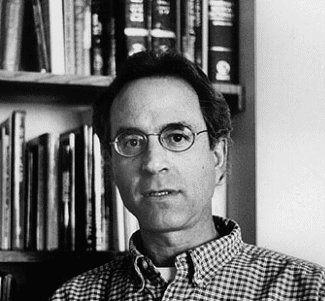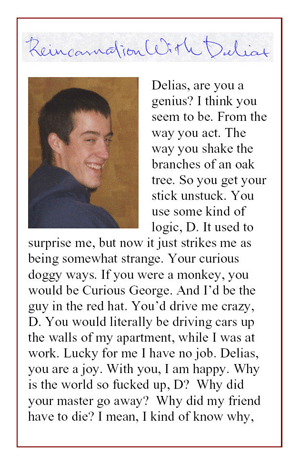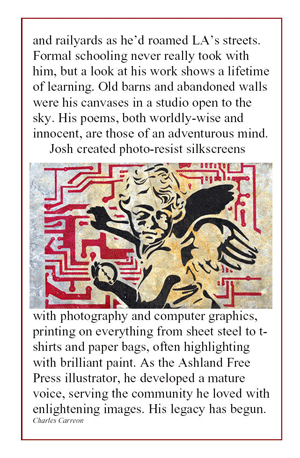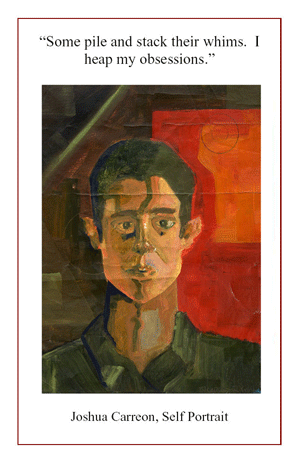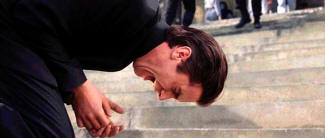by Charles Carreon
August, 2003
I just finished reading "DMT: The Spirit Molecule," by Rick Strassman, M.D. who practices psychiatry in Taos, New Mexico and is a Clinical Associate Professor of psychiatry at the University of New Mexico School of Medicine. Dr. Strassman managed to finagle permits to administer DMT, "an extremely short-acting and powerful psychedelic," at the UNM School of Medicine. Beginning in 1990, and continuing for five years, he administered 400 doses of DMT to 60 human volunteers.
Dr. Strassman has great intellectual credentials, including degrees from Stanford and Albert Einstein College of Medicine at Yeshiva University. He interned in general psychiatry at U.C. Davis Medical Center where he received the Sandoz Award for outstanding graduate resident in 1981. He has also been a Zen Buddhist for over 20 years and is deeply interested in the liberating spiritual potential of psychedelic drugs. Dr. Strassman's avowed purpose for his DMT work was to find ways to do good things for people with psychedelic drugs, but he was compelled to follow strict bio-medical protocols that ultimately hamstrung his research efforts and made him question whether there was any point in continuing. He left the project after his wife contracted cancer, and the promised additional support for his psychedelic research from other medical professionals failed to materialize. Dr. Strassman makes it clear that a great way to screw up a promising scientific career is to become interested in psychedelic research. He recounts a telling conversation with an anonymous "Dr. K," at the San Diego V.A. Hospital. Dr. Strassman was on his fellowship, and was having a "rambling and wide-ranging" conversation with Dr. K., when he ventured one of his pet theories:
"Do you think," I offered, "that the pineal [gland] might produce psychedelic compounds? It seems to have the right ingredients. Maybe it somehow mediates spontaneous psychedelic types of states -- psychosis for example." Dr. K. stopped in his tracks and turned on his heels. His brow furrowed and he peered at me intently through his glasses. A palpable menace glinted from his eyes. "Ooops," I thought. "Let me tell you this, Rick," he said slowly and firmly. "The pineal has nothing to do with psychedelic drugs."
Dr. Strassman learned his lesson, and did not speak the words "pineal and psychedelic in the same breath to anyone" for the remainder of the year.
Of course, we expect scientists to be uptight, because they have grants to protect, wives to support, kids to feed, and politicians to please. However, Strassman never expected to discover that his fellow Zen Buddhists were even more uptight than Dr. K., who just didn't want anyone screwing up his reputation in the pineal gland business.
Strassman's experiments utilized intravenous injections of DMT at dosage levels calculated at .05 mg./kg. of body weight for a low dose, and .4 mg./kg. for a high dose. The onset of psychedelic effect after injection is immediate with doses of .2 mg./kg. and above. What Strassman discovered in his experiments upended his hypothetical applecart. He expected people to have mystical and near-death type experiences. He did not expect for many of his experimental subjects to declare with certainty that they had met other beings during their experience, whom they described as "clowns" or "elves," who took an intensive interest and delight in the experimental subject's appearance in their dimension. These beings reside behind the brilliantly colored curtains of psychedelic light that immediately invade the visual sense field within seconds after administration of the drug. Ultimately, Dr. Strassman seemed to give up on his efforts to interpret these beings as projections of psychological features, as one subject after another refused to accept that characterization, insisting that the beings were real, the place where they met the beings was real, and they did not reflect mere inner experiences in a Freudian or Jungian sense.
Dr. Strassman was also surprised when one person after another recounted experiences strangely reminiscent of alien abduction stories when receiving a high dose of DMT. Admittedly, Dr. Strassman was administering the DMT in a large hospital, where medical hardware was everywhere present, and bio-medical protocols required that he take blood draws, blood pressure readings, and even EEGs and MRIs of people tripping their brains out. Nevertheless, lots of people recorded experiences that involved detailed visualizations of large numbers of intelligent beings, often reptilian or automaton-like, tending huge machines in vast illuminated complexes, and performing examinations of the experimental subject. They often bonded with one of the strange beings and were regarded indifferently by the rest.
This reminded me of my friend Ernesto's DMT experience that he recently recounted. Depositing the DMT powder on a bed of dried pscyhotria viridis, which has a small amount of naturally occurring DMT in it, and putting another layer of psychotria viridis on top of the dust (to prevent it from bursting into flame) he applied a butane lighter flame and consumed the entire bowl in one breath. The effects were as fast as promised, and as he exhaled the white smoke, complex colored patterns appeared in the smoke-swirls. His entire psychosomatic system began to vibrate, from the inside out and from the outside in, and the only thing he could hear was a mantra, a single word repeated endlessly. This mantra seemed to protect him from disorganizing energy, keeping him collected around his center. He felt a bit of anxiety that the experience might get out of control, but it did not. With eyes open or closed, he saw colored patterns of an extremely complex geometric structure that gradually began to resemble reptilian structures such as scales and bones. After around five minutes, Ernesto got up from his seat and laid down under a blanket. There, for around the next 1-1/2 hours, he continued to experience a reptilian presence. This reptilian presence was somewhat disturbing to Ernesto, because of the conditioning we have against reptiles, but the reptile presence spoke to him gently, encouraging him to appreciate the reptilian history in his body, and its great strength and resilience. The reptilian spirit told him that it was a source of his strength, that he needed in order to succeed as a living being. Ernesto accepted this understanding, and gradually dealt with the tension between conditioned repulsion and wholesome self-acceptance. He saw images of primitive spears, the extensions of reptilian talons and claws. In days following, Ernesto's strength and resolve in the course of ordinary life seemed strengthened and smoothly directed. A few nights later, he advised, he had brief DMT-like colored visions in his dreams. He stated that the experience had not been anywhere near as frightening as common stories had caused him to expect, and if given the opportunity, he would try another DMT voyage.
According to his grant proposal, Dr. Strassman was not supposed to be giving therapy, but leading people through the inner world always requires the intuitive skills of a healer. He never knew when one of his experimental subjects would experience a terrifying upheaval. One poor fellow, a happy raver-type with charming looks and a light-hearted attitude, who had consumed lots of MDMA (ecstasy) in recreational settings, suffered a nightmare ordeal on a high-dose trip. The drug kicked in, his feet convulsed in a kicking motion, and he remained rigid for ten minutes. Then he opened his eyes, sat up, and declared that he had just been raped anally by two crocodiles who sat on his chest and immobilized him so completely that he was unable to sit up or reach out for a comforting hand. As he put it, when the experience began he thought it was a dream but "then realized it was really happening." Of course, with the time distortion effect added in, this was a monolithic exercise in agony. Interestingly, this subject considered the experience fundamentally beneficial, in that it increased his appreciation for ordinary life. He cut down on his ecstasy-taking in trivial social interactions, moved in with his girlfriend, and assumed a quiet lifestyle.
Whether covered with contrived nonchalance, or with a veneer of spiritual sophistication, the soft underbelly of the human psyche is quickly exposed by this substance. A woman who prepared for her session by flipping through the New Yorker had an extremely miserable trip on a very low dose and accepted no further injections. A modern-day shaman named Carlos kept trying to explain away his high anxiety before each administration of the drug, which induced violent shaking notwithstanding his profession that his first dose was nothing much. Eventually he had a full death experience that he considered fully valid spiritually, but wished he had been with friends out in the mountains when it took place. But some of the most enthusiastic were unable to continue. In certain cases, DMT high-doses induce huge spikes in blood pressure, in one case so severe Dr. Strassman was ready to call the cardiac team, and diagnosed the slight headache that the subject felt after the trip as the result of extreme vaso-dilation in the large blood vessels that enter the base of the skull. But the experimenter was pleased with the experience, and notwithstanding his disability, wished to take further trips. Though he was not permitted by Strassman, the subject remained grateful and considered it a very important experience that confirmed the rightness of his spiritual direction.
Under the guise of trying to determine whether DMT administration develops a tolerance in the user, Dr. Strassman developed a protocol of four high-dose injections approximately one hour apart. These doses were .3 mg./kg., not the highest dose but plenty psychedelic. Dr. Strassman said that everyone who was given the opportunity persevered through all four doses, a moderately exhausting experience.
First, the answer to the tolerance question -- DMT does not build up a tolerance, and each successive dose was just as powerful as the first. What changed was the character of the experience, which seems to profit from familiarity. The first high dose trip is the shocker, when people don't know what they are going to see and aren't sure they like seeing it. The second and third trips grow increasingly familiar. And by the fourth trip, many people felt cleaned out, healed and freed of persistent anxiety. One young woman in her early twenties who professed a lesbian orientation and was highly attractive to people of both sexes, had a persistent pain in her belly. She had been raped repeatedly by her step-father at sixteen. During her four sessions, she met the beings on the other side, whom she called the elves, and discharged the pain in her midsection, which she connected with the rapes. She valued the experience very highly and felt that she would now enjoy her life a great deal more.
In addition to the powerful psychedelic effects, which caused people to blurt out things like, "Here we go!" and "They were on me quick," DMT releases large amounts of vasopressin, prolactin, growth hormone, and corticotropin, all of which may have psychological effects. During the drug effect, pupil diameter doubled within two minutes, and body temperature would rise. Dr. Strassman's theory that the pineal gland may produce DMT seems unsupported by the information in the book, but it is an intriguing theory, an explanation for why this organ, centrally located in the brain, contains so many of the precursor substances that create DMT.
Reasons for joining the experiment were the expected -- people wanted new experiences, wanted to understand the nature of their own existence and God, and wanted to deepen their understanding of life. Interestingly, many of them found a bit of what they were looking for, or at least thought they had. Dr. Strassman himself became increasingly uncertain as he looked for concrete changes in behavior, beyond expostulations of enthusiasm. From my point of view, Dr. Strassman may have been looking too hard in the wrong places. When it comes to judging how we are doing, it's hard to say that anyone knows better than we ourselves.
After years of doing the work, Dr. Strassman indeed was getting tired. One can imagine the stress of responding to the heightened mental states and emotional reactions of sensitive people questing for self knowledge. Then his wife got cancer and they moved to Canada to be closer to her relatives. Dr. Strassman started commuting to Albuquerque from Canada every couple of months, jamming in as many psychedelic sessions as possible. The fatigue took a further toll.
As I mentioned, Dr. Strassman is a long-time practicing Zen Buddhist, and like many Buddhists, had talked with other Buddhists about how LSD had led them into the search for enlightenment. He had a number of friends, long-time students in an unnamed Zen Buddhist organization that we could possibly identify by connecting the dots: the group is based in the midwest, the teacher died recently, the head of the organization is now a woman, and the organization chooses its leaders by election. It is a large group. Also, they are a bunch of assholes.
How do we know they are assholes? Because they dumped shit all over poor Dr. Strassman when he needed it the least. He had shared his thoughts about his work, and his hopes and aspirations to connect the spiritual path with psychedelic methods, disclosing deep thoughts to a person he thought was his spiritual counselor. Within the DMT sessions themselves, he incorporated attitudes of modeling equanimity and projecting compassion, Buddhist attitudes that helped subjects to benefit from the experience. Additionally, he selected for the experiment numbers of persons who had experience with psychedelic drugs and meditation, believing that they were best adapted to deal with the jarring effects of the experience. For all this respect and the place of honor that Dr. Strassman accorded Buddhism in his life and work, he was rewarded with the most arrogant, presumptuous declaration of insult that I have heard delivered from a Buddhist source in recent years. His former Buddhist pals derided his work with DMT as "not right livelihood," and denounced his plan to administer psychedelics to the terminally ill as an "appallingly dangerous" effort to "play God." With the full confidence of having reached enlightenment themselves, they decreed: "An attempt to induce enlightenment experiences by chemical means can never, will never, succeed. What it will do is badly confuse people and result in serious consequences for you."
This pronouncement certainly confused Dr. Strassman, who until then had been receiving encouragement from his old stoner pals who had put on Buddhist robes. He realized that there was a succession struggle going on within the Zen group, because the old abbot was dying, and "senior monks were lobbying for elected posts," each vying for the position of "most zealous defender of the teaching."
Then Dr. Strassman really stuck his foot in it. He published an article in Tricycle, Fall 1996, calling for "a discussion of integrating psychedelics into Buddhist practice." As Dr. Strassman put it, the "article sealed my fate ... my lifelong affiliation with the order would implicate it as contributing to these new ideas." In order to distance the Zen group from Dr. Strassman's vile heresy, his erstwhile friend, a nun who had been elected new chief poobah, "sent copies of the Tricycle article to members of my new meditation group as well as to other groups and the monastery [including] scribbled comments" Dr. Strassman had made during their private conversations. She also "wrote to the local congregation telling them not to enter my house because there might be psychedelic drugs kept in it." (This reminds me of James Thurber's mother-in-law's fear that electricity might leak out of the sockets and electrocute you. It also reminds me of Timothy Leary's statement that LSD is a substance well-known to cause insanity in those who have not taken it.) This betrayal by his old spiritual comrades was apparently the last nail in the DMT experiment's coffin. Says Dr. Strassman, "Although I could see beyond the hypocrisy that motivated much of the monastery's repudiation of my work, it took its toll." Shortly thereafter, he wrote closing summaries on all of his projects, packed up his drugs and mailed them to a secure facility near Washington, D.C., where "the supplies of DMT, psilocybin, and LSD remain ... to this day." Probably right next to the Ark of the Covenant, left there by Indiana Jones.
To read Dr. Strassman's account of the screwing he got at the hands of the robed bitches, check out Chapter 20 of his book, entitled "Stepping on Holy Toes."
STEPPING ON HOLY TOES
by Rick Strassman, M.D.
Chapter 20 from "DMT: THE SPIRIT MOLECULE"
There generally is little support for the incorporation of spirituality, with its nonmaterial and therefore non-measurable factors, into clinical research's fold. We will see in this chapter that neither is organized religion, no matter how mystically inclined, open-minded and secure enough to seriously consider the spiritual potential of clinical research with psychedelics.
There are several places in this book where I refer to my interest in Buddhist theory and practice. In addition to theoretical and practical contributions to the research, I also received much personal support and guidance from decades of involvement with an American Zen Buddhist monastery. From the initial inspiration for the psychedelic research to the development of the rating scale and our methods of supervising sessions, my understanding of Buddhism pervaded nearly every aspect of working with the spirit molecule.
Being raised a Jew in southern California in the 1950s and 1960s, my religious training emphasized learning the Hebrew language and Jewish festivals, history, and culture. We also remembered the Holocaust and supported the newly formed Jewish state of Israel. We learned little about how to directly encounter God. This was something for the ancient patriarchs alone: Abraham, Isaac, Jacob, and Moses.
There were moments of joy in my Jewish education. Singing Hebrew folk songs and prayers in large groups was ecstatic, although I didn't use that word at the time. So were the complex swirling and whirling Israeli folk dances we learned. In addition, one of my religious school teachers did try teaching us to meditate. We closed our eyes when she did, and then looked around the room through half-shut lids to see who was peeking. Our teacher had a beatific expression on her face, sitting at her desk, fingers interlaced in front of her lap. Once or twice during this classroom meditation I glimpsed something inside that felt good, calm, and right, but I also was startled and a little uncomfortable contacting it.
I later found Eastern religious teachings and practices provided the most accessible methods to begin satisfying the desires for deeper truths that emerged during my college years. In this way I'm similar to many of my generation. These "new religions" included Zen and other forms of Buddhism, Hinduism, and Sufism. Their emphasis on mystical union with the source of all being resonated deeply with that need for ultimate truth. The personal certainty embodied in recently arrived Japanese, Indian, and Tibetan teachers, and the spiritual exercises that promised results confirmed by generations of practitioners, combined to make an irresistible package.
My introduction to the mysteries of the East came in the form of Transcendental Meditation in the early 1970s. I enjoyed the quiet and peacefulness of this practice, but the intellectual underpinnings did not appeal to me. Soon thereafter, I discovered in Buddhism both the practical and intellectual inspiration I was seeking.
Buddhism is a meditation-based religion, 2,500 years old, that in impartial, psychological, and relatively easily accessible terms describes and considers all the states of mind one could possibly imagine, whether horrific, beatific, neutral, helpful, or harmful. In addition, Buddhism offers practical, cause-and-effect moral codes that apply the insights of meditation to daily life.
It took a few tries to find a suitable Buddhist community. Once more, Jim Fadiman at Stanford pointed me in the right direction, this time to a midwestern United States Zen monastery run by a rather reclusive, but startlingly solid, Asian teacher. I attended two weekend meditation retreats there in 1974 and felt as if I had arrived home. The monks were serene but down to earth, and we enjoyed being with each other. Most interesting was that most of them had gained their first view of the spiritual path while on psychedelic drugs.
They did not volunteer this information, of course. But in the free-wheeling early days of the temple, such informal self-disclosure was common. It was as simple as asking, "Did you take psychedelics before becoming a monk? How important were they in your decision?" The overwhelming majority had taken them and had experienced their first glimpse of the enlightened state of mind with their assistance.
A five-week retreat at the monastery during a break from medical school helped me develop a portable and efficient Buddhist practice. The meditation was straightforward: sit comfortably, back straight, and just sit. "Just sit" as in "just walk," "just wash the dishes," "just breathe." In other words, focus all your attention on the task at hand. When sitting, therefore, you just sat. No thinking, daydreaming, fidgeting, emotional reactions, talking, or whatever else complicated the sitting process. The regular in-and-out movement of the breath functioned as an excellent anchor, a point upon which the wandering mind could ground and focus its attention whenever distracting thoughts or feelings interrupted uncluttered awareness.
Upon returning to medical school, I reserved a room for lunchtime meditation and there were always one or two people joining me for a half-hour "sit." I stayed in close touch with several monks, visited the monastery regularly, and hosted a retreat led by priests traveling to New York.
Buddhism and meditation also seemed a rich field of academic study. I arranged to take a medical school summer elective for mental health professionals at the Nyingma Institute, which had been established by a Tibetan Buddhist lama in the hills of Berkeley, California. During this course we learned the basic principles and practices of Buddhist psychology. It was here that I first learned about the Abhidharma, the Buddhist system of psychology.
Abhidharma roughly translates into "catalog of mental states." There are hundreds of Abhidharma texts, but the Nyingma lama was interested in sharing with us only the most basic principles.
One fundamental tenet was that the normal flow of personal experience actually was a smooth synthesis of several component parts. These facts are called the skandhas, or "heaps," the five "things" that make up our conscious state: form, feeling, perception, consciousness, and habitual tendencies. We spent days discussing each of these until we developed a consensus definition with which we felt comfortable and could express in familiar Western terms.
Another important point was the possibility of, and methods for, dissolving the glue that held these skandhas together. By deconstructing, as it were, the facade of our sense of self, Buddhists believe we can access deeper layers of reality, compassion, love, and wisdom. There was a sequence of stages in that process, and a knowledgeable teacher could help the meditator recognize and progress through those steps. Buddhism had refined these techniques over millennia, and millions of practitioners had verified and validated these methods and their results.
While these meditations were more elaborate and complicated than "just sitting," they were fascinating, and they produced the promised results. I needed to write a scientific article on my summer experience, and I used that opportunity to publish a description of the Abhidharma system and some of my own meditative experiences. Learning about Abhidharma also got me thinking about its usefulness in measuring psychedelic states.
Upon graduating from medical school, I returned to California for psychiatric training. There, in Sacramento, I helped establish and administer a monastery-affiliated meditation group that met weekly and sponsored retreats led by monks. For years the group met in my house, and I had many opportunities to discuss my interests, psychedelic and otherwise, with members of the monastic community. At the monastery, I underwent a layperson's ordination into the Buddhist sect whose teachings the abbot followed, and I maintained close ties with my original monk friends, who now were becoming senior members of the priestly hierarchy.
Career and training opportunities drew me away from Sacramento after my four-year psychiatric residency at the University of California in Davis, but I returned two and a half years later to join their faculty. The local meditation group I helped establish still met, but the parent organization's structure had changed substantially. Many monks had left the fold as the teachings became increasingly focused on the teacher himself and his spiritual experiences. At the same time the abbot was becoming more reclusive, surrounding himself with trusted assistants. In addition, there now existed a hierarchy within the lay community. The atmosphere had taken a turn toward "who is in, and who is out." The informal and relaxed give-and-take no longer existed.
When I later moved to New Mexico, I considered myself loosely affiliated with the monastery's extended Buddhist community. I was not inclined to deal with the political structure now necessary to start a local meditation group, but I did seek out other local members and I meditated with them regularly in an informal setting. In addition, I remained in regular contact with several monks at the head temple, many of whom were now twenty-year acquaintances. While the monastic community as a whole had lost some of its luster, I considered it my spiritual home and was married there in 1990.
There are many ways my Buddhist training and practice affected the DMT research. One of these was in how we supervised volunteers' encounters with DMT.
Supervising psychedelic sessions usually is called "sitting." Many believe this comes from the idea of "babysitting" people who are in a highly dependent, at times confused and vulnerable state. Even more importantly, though, is "sitting" in the meditational sense. The research nurse, either Cindy or Laura, and I did our best to practice "just sitting" while being with our volunteers: watching the breath, being alert, eyes gazing straight ahead, ready to respond, keeping a positive and aware attitude, letting the research subject's experience unfold without unnecessary interference.
My understanding of meditation also helped me guide people through the stages of the DMT experience. For example, I applied the Abhidharma's model of mind when coaching volunteers not to get swept away by the onslaught of colors, or to investigate the space within the grains of wood in the door if they kept their eyes open. Suggesting volunteers let go, focus on the breath and body sensations, keep an open but fluid mind to whatever came their way--all of these were tools I had acquired during decades of meditation practice and study.
Another example of how psychedelics and Buddhist meditation met was in the development of our rating scale.
Previous paper-and-pencil psychological questionnaires that measured psychedelic drug effects had serious shortcomings. They assumed that psychedelics were "psychotomimetic" or "schizotoxic," and therefore they emphasized unpleasant experiences. Many of these scales were developed using volunteers, sometimes ex-narcotic-addict prisoners, who were not told what drugs they were given, or what the effects might be.
To offer an alternative to these tools for measuring the psychedelic experience, I used an Abhidharma and skandha-based method of characterizing mental states. This purely descriptive model meshed well with what's known as the "mental-status" approach to interviewing psychiatric patients: You talk with someone and gently investigate the quality of their basic mental functions, such as mood, thinking, and perceptions.
The familiar Abhidharma terms "form," "feeling," "perception," "consciousness," and "habitual tendencies" became the framework or structure within which the rating scale's questions emerged, and how we classified replies to those questions. However, instead of calling them skandhas, "clinical clusters" seemed more appropriate and palatable for a Western scientific audience.
We gave and analyzed this new questionnaire, the Hallucinogen Rating Scale, or HRS, at the end of every DMT session for the entire project. The results were remarkable.
It is well-known in clinical psychopharmacology that a good questionnaire is more sensitive than any biological factor in assessing drug effects. In other words, a well-designed rating scale is better than measurements of blood pressure, heart rate, or hormone levels in distinguishing doses of a drug, or different types of drugs, from each other. I hoped that the HRS would follow in that tradition, and this it did without difficulty. We were better able to separate responses to various doses of DMT, or the effects of combining DMT with other drugs, using HRS scores than by measuring changes in any biological variable, including all the cardiovascular and blood hormone data. However, it also validated the wisdom and strength of the Buddhist approach to mental states.
Clifford Qualls, Ph.D., the Research Center biostatistician, and I grouped together HRS questions using the "clinical cluster" or skandha method and compared this method of analysis to a large number of alternative purely statistical models. The Abhidharma's technique was as good as, if not superior to, ones developed solely upon mathematical considerations. Since the computer-derived classification of results was no better than the clinical cluster one, and since using the skandhas made more sense intuitively, the Buddhist classification system won out. Other groups have since used the HRS and confirmed its usefulness in measuring other altered states of consciousness, drug-induced and otherwise.
Buddhism also helped me make sense of people's DMT sessions. Its far-reaching perspective includes all experiences: spiritual, near-death, and even nonmaterial or invisible realms. However, I did come up against two serious limitations in my lack of Buddhist education.
How was I to respond to a volunteer who spoke as if she or he just had undergone a drug-induced spiritual experience? Was it "real" enlightenment or not? As detailed in Chapter 16, "Mystical States," these sessions certainly left me feeling as if something deeply profound had happened. And there was no question on the volunteers' part that they had undergone the deepest and most profound experience of their lives. However, it was beyond my training and expertise to determine the validity or "certifiability" of a volunteer's understanding with anything other than psychiatric models of interpretation.
Another problem was how to relate what I knew about Buddhist approaches to nonmaterial beings with what our volunteers were reporting. For example, Tibetan and Japanese versions of Buddhism possess a full roster of demons, gods and angels. I understood these encounters to symbolically represent certain qualities of ourselves, not autonomous noncorporeal life forms.
When volunteers began reporting contact, my first reactions was, "Oh, this is something they talk about in Buddhism. They are just aspects of our own minds."
These encounters got stranger, however, and the beings started testing, probing, inserting things into, eating, and raping our volunteers. A Buddhist framework seemed less capable of explaining these types of experiences. Generically I could apply the inherent skepticism of Buddhism in taking anything as "real" or "special" about these stories. That is, it was "just meeting beings." These apparent life forms were not necessarily any wiser or more trustworthy than anything else we might meet in our lives or minds.
Nevertheless, I needed some guidance, both for the spiritual experience and the "contact" aspects of our work. I began sharing our findings, and my questions, with trusted monk friends. The one to whom I turned most often was Venerable Margaret, a Buddhist priest I met in 1974 during my first stay at the monastery.
A clinical psychologist in training, Margaret became a Buddhist monk after realizing, "I didn't want to be let loose on the world the way I was." She wanted to experience her own mental and spiritual health before trying to help others. She loved monastic life, however, and stayed on. Margaret and I spoke the same language, shared the same concerns, and viewed the human condition through similarly trained clinical eyes.
Before beginning the actual DMT studies, I happened to spend a few days at the monastery. My two-year journey through the regulatory labyrinth, seeking permission and funding to begin giving DMT, was drawing to a close. Margaret had risen to chief assistant to the abbot, and her time was heavily scheduled. However, we found an opportunity to meet and I updated her on my personal and professional life. The conversation moved into my interest in giving DMT to human research subjects. Sharing with her my belief that the pineal gland might make DMT at mystical moments in our lives, I speculated about its possible role in death and near-death states.
The lanky and shaven-headed woman monk touched the tips of her fingers together in front of her mouth, tenting them in and out. Her intensely blue eyes narrowed, and she looked over my shoulder, meeting the white wall with her gaze.
She said quietly, "What you are suggesting is something that only one out of a million people could do."
I took this intentionally unclear remark as encouragement to go deeper with the topic. Wondering about the role of psychedelics in spiritual development, I commented on how many of the now-senior monks had gotten their first sighting of the spiritual path from LSD and other drugs.
Margaret laughed, saying, "You know, I honestly can't say if my LSD trips helped or hurt y spiritual practice!"
"Hard to tell, isn't it?" I replied.
"Indeed."
She looked at her watch, picked up her tea cup, and graciously excused herself.
The next year, 1990, I was married at the monastery. At separate meetings before the ceremony, I chatted with two other monk friends, now some of the highest ranking officers in the order. Both of them had taken psychedelic drugs in college with a fellow who later became a close friend of mine in New Mexico. This mutual acquaintance was well-known for using MDMA in a psychotherapeutic setting. They both asked about their friend and his MDMA research and were in kind fascinated by my plans to study DMT.
After wrapping up the dose-response study in 1992, I wrote a long letter to Margaret describing the full range of the stories volunteers shared with us, including near-death, enlightenment, and being contact. I also shared with her my feelings that the setting was too neutral, and our volunteers too familiar with psychedelics, for any real beneficial effects to result. I raised the issue of helping people more directly, along the lines of a psilocybin-assisted psychotherapy project with the terminally ill.
I was drawn to a terminal illness study because of the promising work in this area performed during the first wave of psychedelic clinical research in the 1960s. In addition, its emphasis on the positive effects of spiritual and near-death experiences possible with psychedelics appealed to my deeper interest in these drugs.
Margaret replied, "Most interesting! But to what purpose? Maybe future 'helping' work will shed some light on that." She also wondered about the risk-to-benefit ratio and advised performing such a study only if I was sure there were extremely few risks and an equally high likelihood of success. Insightfully, she also asked me to consider the lack of time available to undo any harm incurred from a painful or disturbing psilocybin session.
The years passed quickly, and by the end of 1994 my questions grew regarding the utility of my psychedelic research. Adverse effects accumulated, and long-term benefit was difficult to assess. In addition, the constant exposure to psychedelicized volunteers was beginning to exhaust me. I shared these developments with Margaret.
As always, she supported whatever seemed most useful for my own spiritual growth. If it involved giving up the research, she understood. However, she encouraged me to look for someone to whom I might transfer the project so the work I had begun would not end in my absence.
The additional circumstances described in the last chapter led to my moving to Canada, but I commuted to Albuquerque in order to continue running studies. After relocating, I met the members of the local monastery-affiliated meditation group and started sitting with them. There existed a major branch of the order in a nearby U.S. state across the border, and their priest scheduled a retreat in our community. Venerable Gwendolyn arrived, and the weekend workshop began.
Gwendolyn had entered the head temple directly from her parents' home. She had had a series of extraordinarily profound spiritual experiences at the monastery and was a highly ranked teacher. Nevertheless, she was not especially wise in the ways of the world, and running an urban meditation center was a significant challenge to her social skills.
During a pastoral counseling session with Gwendolyn, I let her know of the New Mexico research and some of my growing ambivalence toward it. I appreciated the opportunity to air my story to a monk who knew nothing about me, and to listen to her fresh perspective.
I was surprised to hear Gwendolyn's voice on the phone a week later.
"I was sick for three days after talking with you, it upset me so. I called the abbot, who as you know is near death. This is the first issue he's taken a personal interest in for over a year. He and I talked, as I did with other senior monks. We have decided you must stop your research immediately. I'll write you this week a more formal letter."
I replied, "Let me think about it."
Two weeks later, a letter came, not from Gwendolyn, but from Margaret. It began with, "I hope what I heard third-hand isn't true. But if it is, let me say this." With that introduction, she began an indictment of my research: past, present, and planned:
"Your psychedelic research is ultimately futile, devoid of real benefit to humanity, and dangerous;
"The idea of administering psychedelics to the terminally ill is to me appallingly dangerous. It comes about as close to 'playing God' as anything I've seen in the mental health professions;
"An attempt to induce enlightenment experiences by chemical means can never, will never, succeed. What it will do is badly confuse people and result in serious consequences for you."
Gwendolyn's letter arrived next.
"[Your research] constitutes wrong livelihood according to the Buddha's teachings.
"That DMT might elicit enlightenment experiences is delusional and contrary to the teachings of the Buddha;
"Hallucinogens disorder and confuse the mind, impede religious training, and can be a cause of rebirth into realms of confusion and suffering;
"This is the teaching and viewpoint of myself, [the abbot], [the order], and the whole of Buddhism.
"We urge you to cease all such experiments."
I reminded these monks of the years of dialogue I'd had with them regarding my interest in and performance of psychedelic research. I also pointed out the continuous interest in my work by members of the community, and the absence of any prior recommendations to avoid or stop it. If anything, there was enthusiasm and encouragement to use these interests as grist for going deeply into my own spiritual relationship to the outside world. I recalled the many conversations I'd had with monks who'd validated the importance of their psychedelic experiences as leading to their first inklings of enlightenment.
Additionally, I was eager to discuss some of their concerns. These included the obvious problems associated with thinking that certain knowledge was accessible only with an outside agent; that is, a drug. I also accepted the theoretical possibility raised by Gwendolyn that someone might mistake a real enlightenment experience for a psychedelic "flashback."
However, none of these attempts at enlarging the dialogue met with any success.
What was going on?
The abbot was dying, and he was making sure the teachings he left behind were as unsullied by controversy as possible. In addition, senior monks were lobbying for elected posts that would determine the future of the community. Who was the most zealous defender of the teaching? Those whose positive psychedelic experiences had led them to Buddhism in the first place had to remain silent, and close rank behind those without such backgrounds. Psychedelics could not become a divisive issue at this crucial moment in the monastery's existence.
And then the Fall 1996 issue of Tricycle, The Buddhist Review came out with my article calling for a discussion of integrating psychedelics into Buddhist practice.
In that article I presented Elena's first high-dose session, which we've read in Chapter 16, "Mystical States." Her experience served as an example of the type of spiritual breakthrough possible with DMT in someone open to them--that is, a person with a serious meditation practice, solid psychological mindedness, and a deep reverence and respect for drugs like DMT. I also raised the concern that isolated experiences, occurring without any sort of spiritual or therapeutic context, were not especially effective in producing long-term serious change in our volunteers. I therefore concluded with the following:
"I believe there are ways in which Buddhism and the psychedelic community might benefit from an open, frank exchange of ideas, practices, and ethics. For the psychedelic community, the ethical, disciplined structuring of life, experience, and relationship provided by thousands of years of Buddhist communal tradition have much to offer. This well-developed tradition could infuse meaning and consistency into isolated, disjointed, and poorly integrated psychedelic experiences. The wisdom of the psychedelic experience, without the accompanying and necessary love and compassion cultivated in a daily practice, may otherwise be frittered away in an excess of narcissism and self-indulgence. While this is also possible within a Buddhist meditative tradition, it is less likely with the checks and balances in place within a dynamic community of practitioners.
"On the other hand, dedicated Buddhist practitioners with little success in their meditation, but well along in moral and intellectual development, might benefit from a carefully timed, prepared, supervised, and followed-up psychedelic session to accelerate their practice. Psychedelics, if anything, provide a view. And a view, to one so inclined, can inspire the long hard work required to make that view a living reality."
This article sealed my fate within the monastic community. My lifelong affiliation with the order would implicate it as contributing to these ideas. Gwendolyn sent copies of the Tricycle article to members of my new meditation group as well as to other groups and the monastery. In it she scribbled comments she remembered I made during what I believed was our confidential pastoral counseling session. She wrote to the local congregation, telling them not to enter my house because there might be psychedelic drugs kept in it.
Her behavior brought these issues to the boiling point. I lodged a formal complaint against this breach of confidence. As much as calling Gwendolyn's behavior into question, I wanted a definitive statement from the order regarding their attitude about my research. They complied on both counts.
The monastic review agreed she had indeed broken confidence, but it was for a "greater good." That is, it was done to "prevent mistakes from being made in the name of Buddhism." One could not be a proper Buddhist and consider psychedelics to play any part in it.
There was little I could do. Holiness had won out over truth. This particular brand of Buddhism was no different from any other organization whose survival depended upon a uniformly accepted platform of ideas. Only they could determine what were permissible questions, and what were not.
Later I learned that the monastic community had elected Margaret head of the order. The two monks who had taken psychedelics years before with my New Mexico friend also did well in the elections. One was elected abbot of the monastery, the other his chief assistant. So political ambitions also took on greater importance than a truthful dialogue. It was unlikely that the organization could admit and openly discuss that their three leading teachers were former LSD users, or that they had decided to enter a monastic life after drug-induced inspiration.
Although I could see beyond the hypocrisy that motivated much of the monastery's repudiation of my work, it took its toll. Combined with the events and circumstances I described in the last chapter, my energy to continue with the research flagged considerably. After completing two long-distance research trips to Albuquerque, the extra pressure exerted by my spiritual community broke down the last remnant of my desire to continue. It was time to stop.
I resigned from the university and returned the drugs and the last year's worth of grant money to the National Institute on Drug Abuse. I wrote closing summaries on all the projects and sent copies to the boards and committees who had been working with me for the past seven years. The pharmacy weighed all our drugs, packed them up, and mailed them to a secure facility near Washington, D.C. The supplies of DMT, psilocybin, and LSD remain there to this day.

